Schmitt C.B. (ed.) The Cambridge History of Renaissance Philosophy
Подождите немного. Документ загружается.

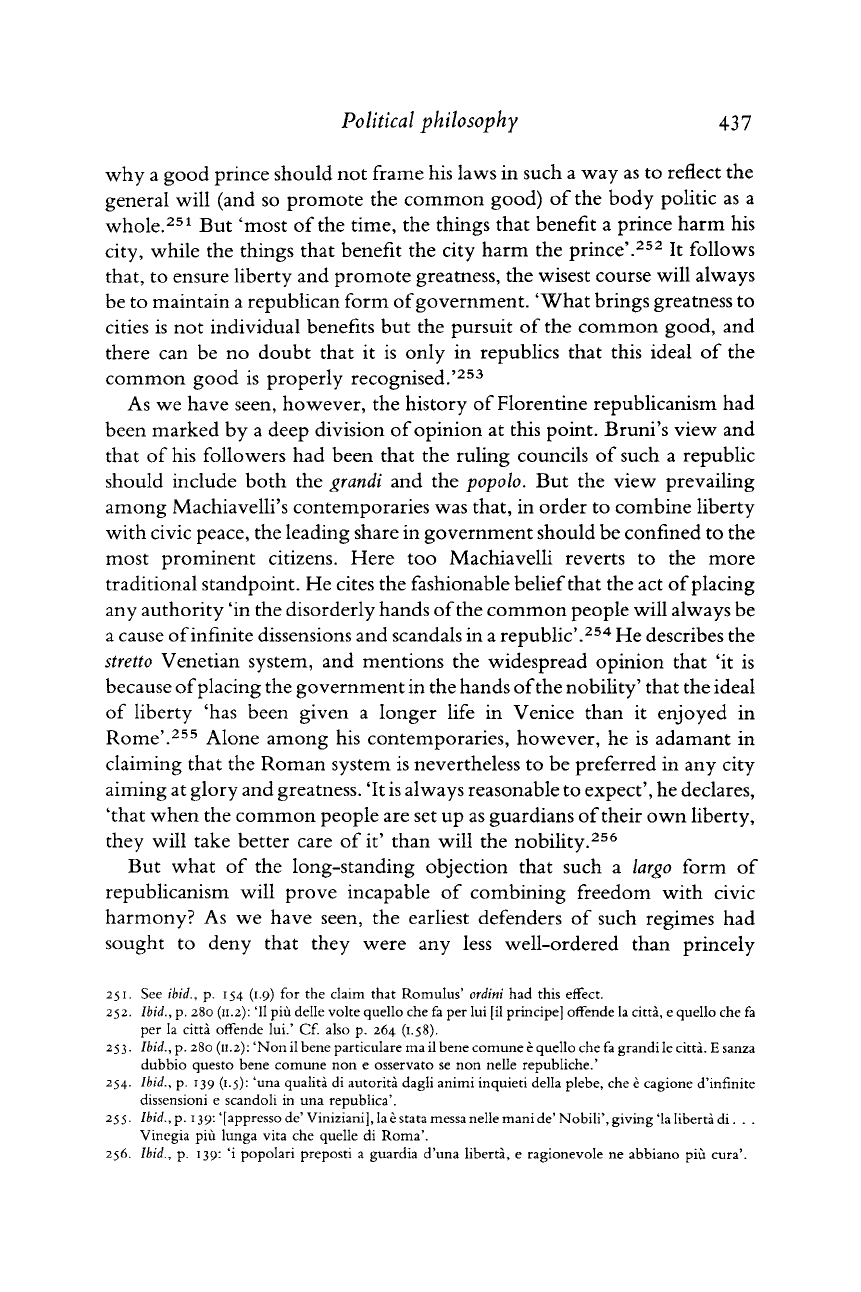
Political
philosophy
437
why a good prince should not frame his laws in such a way as to reflect the
general
will
(and so promote the common good) of the body politic as a
whole.
251
But 'most of the time, the things that benefit a prince harm his
city,
while
the things that benefit the city harm the prince'.
252
It
follows
that,
to ensure liberty and promote greatness, the
wisest
course
will
always
be to maintain a republican form
of
government. 'What brings greatness to
cities is not individual benefits but the pursuit of the common good, and
there
can be no doubt that it is only in republics that this ideal of the
common good is properly recognised.'
253
As we have seen, however, the history of Florentine republicanism had
been marked by a deep
division
of opinion at this point. Bruni's
view
and
that
of his followers had been that the ruling councils of such a republic
should include both the
grandi
and the
popolo.
But the
view
prevailing
among Machiavelli's contemporaries was that, in
order
to combine liberty
with civic peace, the leading share in government should be confined to the
most prominent citizens. Here too
Machiavelli reverts to the more
traditional
standpoint. He cites the fashionable belief
that
the act
of
placing
any
authority 'in the disorderly hands
of
the common people
will
always be
a
cause
of
infinite dissensions and scandals in a republic'.
254
He describes the
stretto
Venetian system, and mentions the widespread opinion that 'it is
because
of
placing the government in the hands
of
the nobility' that the ideal
of
liberty 'has been given a longer
life
in Venice than it enjoyed in
Rome'.
255
Alone among his contemporaries, however, he is adamant in
claiming that the Roman system is nevertheless to be preferred in any city
aiming at glory and greatness. 'It is always reasonable to expect', he declares,
'that
when the common people are set up as guardians
of
their
own liberty,
they
will
take better
care
of it' than
will
the nobility.
256
But
what of the long-standing objection that such a
largo
form of
republicanism
will
prove incapable of combining freedom with civic
harmony?
As we have seen, the earliest defenders of such regimes had
sought to deny that they were any
less
well-ordered than princely
251.
See ibid., p. 154 (1.9) for the
claim
that
Romulus'
ordini had
this
effect.
252. Ibid., p. 280 (11.2): 'Il più
delle
volte
quello
che fa per lui [il
principe] offende
la
città,
e
quello
che fa
per la
città
offende
lui.' Cf.
also
p. 264
(1.58).
253. Ibid., p. 280 (11.2): 'Non il
bene
particulare
ma il
bene
comune
è
quello
che fa
grandi
le
città.
E
sanza
dubbio
questo
bene
comune
non e
osservato
se non
nelle
republiche.'
254. Ibid., p. 139 (1.5): 'una
qualità
di
autorità
dagli
animi
inquieti
della
plebe,
che è
cagione
d'infinite
dissensioni
e
scandoli
in una
republica'.
255. Ibid.,p.
139:'[appresso
de'Viniziani],
la è
stata
messa
nelle
mani
de'Nobili',
giving'la
libertà
di. . .
Vinegia più
lunga
vita che
quelle
di Roma'.
256. Ibid., p. 139: 'i
popolari
preposti
a
guardia
d'una
libertà,
e
ragionevole
ne
abbiano
più cura'.
Cambridge Histories Online © Cambridge University Press, 2008
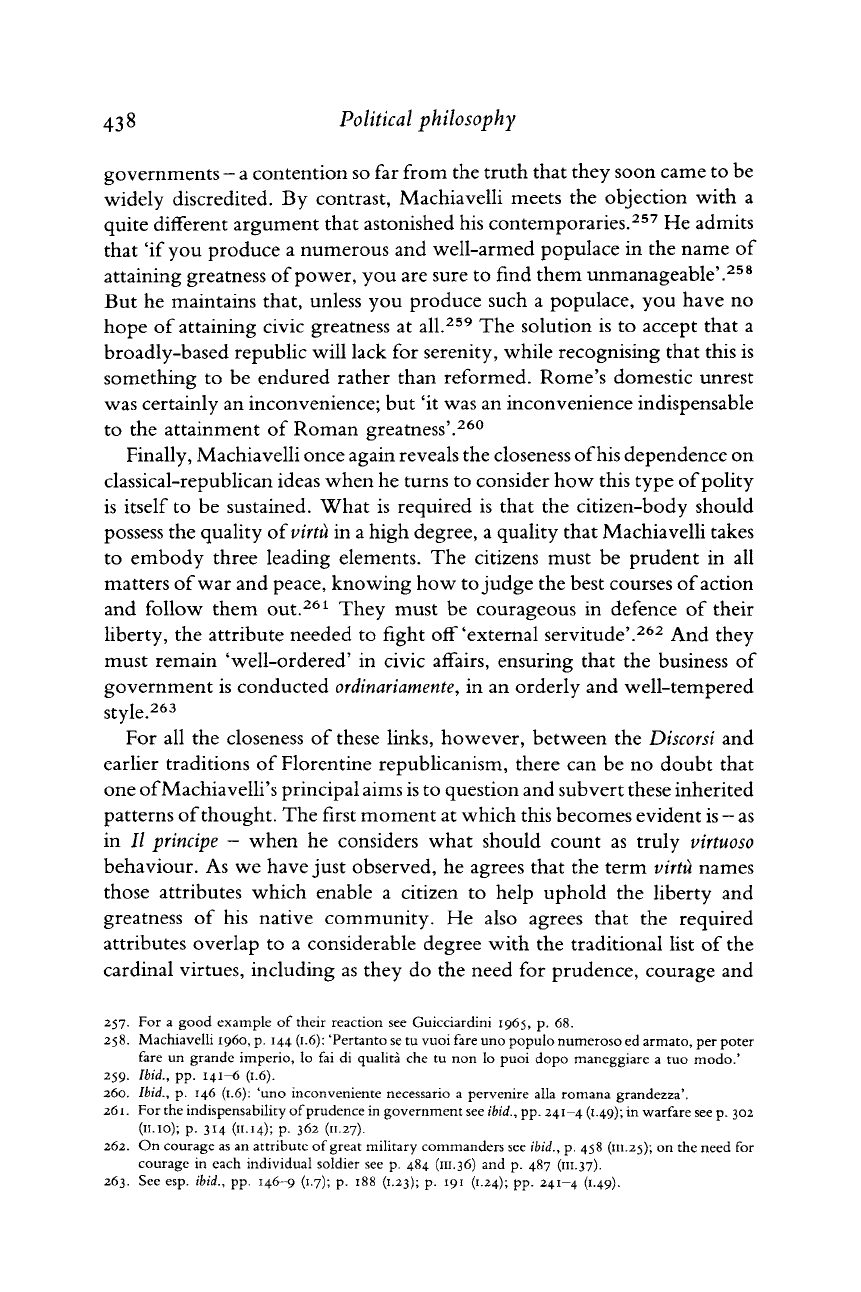
43«
Political
philosophy
governments - a contention so far from the truth that they
soon
came to be
widely
discredited. By contrast, Machiavelli meets the objection
with
a
quite different argument that astonished his contemporaries.
257
He admits
that
'if you produce a numerous and well-armed populace in the name of
attaining greatness of power, you are sure to
find
them unmanageable'.
258
But
he maintains that,
unless
you produce such a populace, you have no
hope of attaining civic greatness at all.
259
The solution is to accept that a
broadly-based republic
will
lack for serenity,
while
recognising that this is
something to be endured
rather
than reformed. Rome's domestic unrest
was certainly an inconvenience; but 'it was an inconvenience indispensable
to the attainment of Roman greatness'.
260
Finally, Machiavelli once again reveals the closeness
of
his dependence on
classical-republican ideas
when
he turns to consider how this type
of
polity
is itself to be sustained. What is required is that the citizen-body should
possess
the quality
of
virtu in a
high
degree, a quality that Machiavelli takes
to embody three leading elements. The citizens must be prudent in all
matters
of
war
and peace,
knowing
how to judge the best courses
of
action
and
follow
them out.
261
They must be courageous in defence of their
liberty, the attribute needed to fight off'external servitude'.
262
And they
must remain 'well-ordered' in civic affairs, ensuring that the
business
of
government is conducted
ordinariamente,
in an orderly and well-tempered
style.
263
For
all the closeness of these links, however, between the
Discorsi
and
earlier
traditions of Florentine republicanism, there can be no doubt that
one
of
Machiavelli's principal aims is to question and subvert these inherited
patterns
of
thought. The first moment at which this becomes evident is
—
as
in 17
principe
-
when
he considers what should count as truly
virtuoso
behaviour. As we have just observed, he agrees that the term virtu names
those attributes which enable a citizen to
help
uphold the liberty and
greatness of his native community. He also agrees that the required
attributes
overlap to a considerable degree
with
the traditional
list
of the
cardinal
virtues, including as they do the need for prudence, courage and
257. For a
good
example
of
their
reaction
see
Guicciardini
1965, p. 68.
258.
Machiavelli
i960,
p. 144 (1.6):
'Pertanto
se tu
vuoi
fare
uno
populo
numeroso
ed
armato,
per
poter
fare
un
grande
imperio,
lo fai di
qualita
che tu non lo
puoi
dopo
maneggiare
a tuo
modo.'
259. Ibid., pp. 141-6 (1.6).
260. Ibid., p. 146 (1.6): 'uno
inconveniente
necessario
a
pervenire
alia
romana
grandezza'.
261. For the
indispensability
of
prudence
in
government
see ibid., pp. 241-4
(1.49);
in
warfare
see p. 302
(11.10); p. 314 (11.14); p. 362 (11.27).
262. On
courage
as an
attribute
of
great
military
commanders
see ibid., p. 458 (111.25); on the
need
for
courage
in
each
individual
soldier
see p. 484 (111.36) and p. 487 (111.37).
263. See esp. ibid., pp. 146-9 (1.7); p. 188
(1.23);
p. 191
(1.24);
pp. 241-4
(1.49).
Cambridge Histories Online © Cambridge University Press, 2008
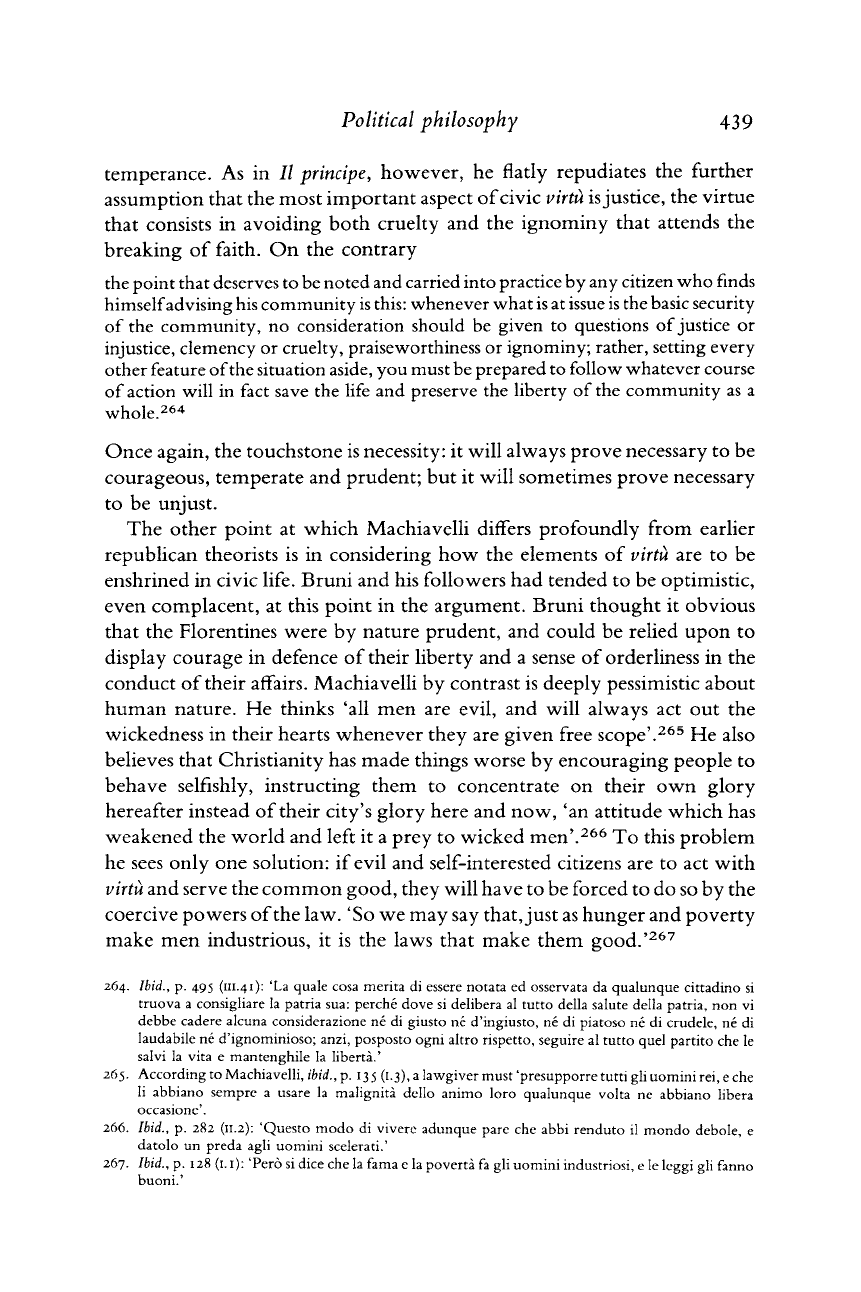
Political
philosophy
439
temperance.
As in II
principe,
however, he flatly repudiates the further
assumption that the most important aspect
of
civic virtù is
justice,
the virtue
that
consists in avoiding both cruelty and the ignominy that attends the
breaking of faith. On the
contrary
the point
that
deserves to be noted
and
carried
into
practice
by any citizen who
finds
himself advising his community
is
this:
whenever what
is
at
issue
is
the
basic
security
of
the community, no consideration should be given to questions
of
justice or
injustice, clemency or cruelty, praiseworthiness or ignominy;
rather,
setting every
other feature
of
the situation aside, you must be
prepared
to
follow
whatever course
of
action
will
in fact save the
life
and preserve the liberty of the community as a
whole.
264
Once again, the touchstone is necessity: it
will
always prove necessary to be
courageous,
temperate and prudent; but it
will
sometimes prove necessary
to
be unjust.
The
other point at which Machiavelli differs profoundly from earlier
republican theorists is in considering how the elements of virtù are to be
enshrined in civic
life.
Bruni and his followers had tended to be optimistic,
even complacent, at this point in the argument. Bruni thought it obvious
that
the Florentines were by nature prudent, and could be relied upon to
display courage in defence of their liberty and a sense of orderliness in the
conduct of
their
affairs. Machiavelli by contrast is deeply pessimistic about
human
nature.
He thinks 'all men are
evil,
and
will
always act out the
wickedness in their hearts whenever they are given free scope'.
265
He also
believes
that Christianity has made things worse by encouraging people to
behave
selfishly,
instructing them to concentrate on their own glory
hereafter
instead of
their
city's glory here and now, 'an attitude which has
weakened the world and left it a prey to wicked men'.
266
To this problem
he
sees
only one solution: if
evil
and self-interested citizens are to act with
virtù and serve the common good, they
will
have to be forced to do so by the
coercive
powers
of
the law. 'So we may say
that,
just as hunger and poverty
make
men industrious, it is the laws that make them good.'
267
264. Ibid., p. 495
(in.41):
'La
quale
cosa
merita
di
essere
notata
ed
osservata
da
qualunque
cittadino
si
truova
a
consigliare
la
patria
sua:
perché
dove
si
delibera
al
tutto
della
salute
della
patria, non vi
debbe
cadere
alcuna
considerazione
né di
giusto
né
d'ingiusto,
né di
piatoso
né di
crudele,
né di
laudabile
né
d'ignominioso;
anzi,
posposto
ogni
altro
rispetto,
seguire
al
tutto
quel
partito
che le
salvi
la vita e
mantenghile
la
libertà.'
265. According to Machiavelli, ibid., p. 135 (1.3), a
lawgiver
must
'presupporre
tutti
gli
uomini
rei, e che
li
abbiano
sempre
a
usare
la
malignità
dello
animo
loro
qualunque
volta
ne
abbiano
libera
occasione'.
266. Ibid., p. 282 (11.2):
'Questo
modo
di
vivere
adunque
pare
che abbi
renduto
il
mondo
debole,
e
datolo
un
preda
agli
uomini
scelerati.'
267. Ibid., p. 128 (1.1):
'Però
si
dice
che la
fama
e la
povertà
fa gli
uomini industriosi,
e le
leggi
gli
fanno
buoni.'
Cambridge Histories Online © Cambridge University Press, 2008
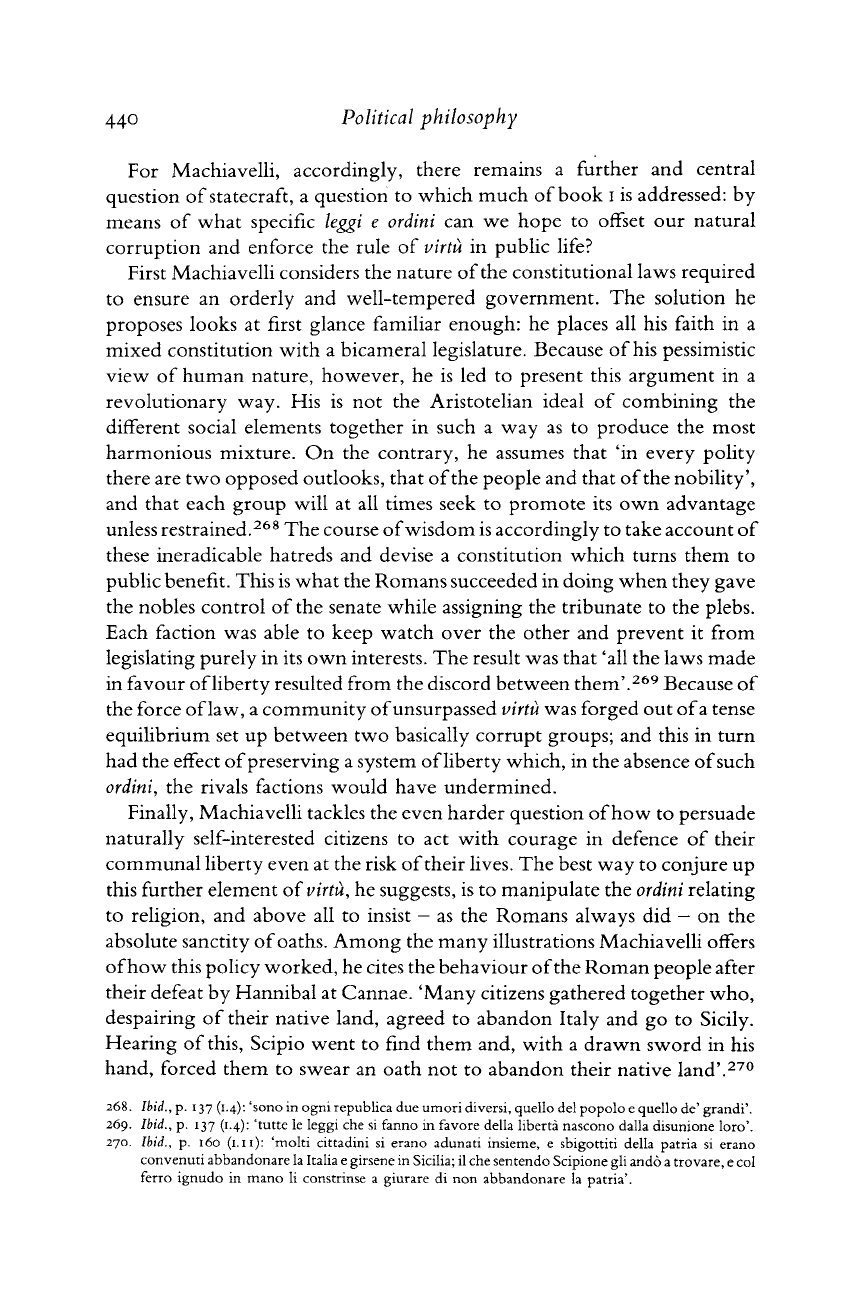
440
Political
philosophy
For
Machiavelli, accordingly, there remains a further and central
question of
statecraft,
a question to which much of book I is addressed: by
means of what specific
leggi
e
ordini
can we hope to offset our natural
corruption
and enforce the rule of virtu in public life?
First
Machiavelli considers the nature
of
the constitutional laws required
to
ensure an orderly and well-tempered government. The solution he
proposes looks at first glance familiar enough: he places all his faith in a
mixed constitution with a bicameral legislature. Because of his pessimistic
view
of human
nature,
however, he is led to present this argument in a
revolutionary
way. His is not the Aristotelian ideal of combining the
different social elements together in such a way as to produce the most
harmonious mixture. On the
contrary,
he assumes that 'in every polity
there
are two opposed outlooks, that
of
the people and that
of
the nobility',
and that each group
will
at all times seek to promote its own advantage
unless restrained.
268
The course
of
wisdom is accordingly to take account of
these ineradicable hatreds and devise a constitution which turns them to
public benefit. This is what the Romans succeeded in doing when they gave
the nobles control of the senate
while
assigning the tribunate to the plebs.
Each
faction was able to keep watch over the other and prevent it from
legislating purely in its own interests. The result was that 'all the laws made
in favour
of
liberty resulted from the discord between them'.
269
Because of
the force
of
law, a community
of
unsurpassed virtu was forged out
of
a
tense
equilibrium set up between two basically
corrupt
groups; and this in turn
had the effect
of
preserving a system
of
liberty which, in the absence
of
such
ordini,
the rivals factions would have undermined.
Finally, Machiavelli tackles the even
harder
question
of
how to persuade
naturally
self-interested citizens to act with courage in defence of their
communal liberty even at the risk
of
their
lives. The best way to conjure up
this further element oí virtu, he suggests, is to manipulate the
ordini
relating
to
religion, and above all to insist
—
as the Romans always did
—
on the
absolute sanctity
of
oaths.
Among the many illustrations Machiavelli offers
of
how this policy worked, he cites the behaviour
of
the Roman people after
their
defeat by Hannibal at Cannae. 'Many citizens gathered together who,
despairing of their native land, agreed to abandon Italy and go to Sicily.
Hearing of this, Scipio went to
find
them and, with a drawn sword in his
hand,
forced them to swear an oath not to abandon their native land'.
270
268. Ibid., p. 137 (1.4):
'sono
in
ogni
república
due
umori
diversi,
quello
del
popólo
e
quello
de' grandi'.
269. Ibid., p. 137 (1.4):
'tutte
le
leggi
che si
fanno
in
favore
della
liberta
nascono
dalla
disunione
loro'.
270. Ibid., p. 160
(1.11):
'molti
cittadini
si
erano
adunati
insieme,
e
sbigottiti
della
patria
si
erano
convenuti
abbandonare
la
Italia
e
girsene
in
Sicilia;
il che
sentendo
Scipione
gli
ando
a
trovare,
e col
ferro ignudo
in
mano
li
constrinse
a
giurare
di non
abbandonare
la patria'.
Cambridge Histories Online © Cambridge University Press, 2008
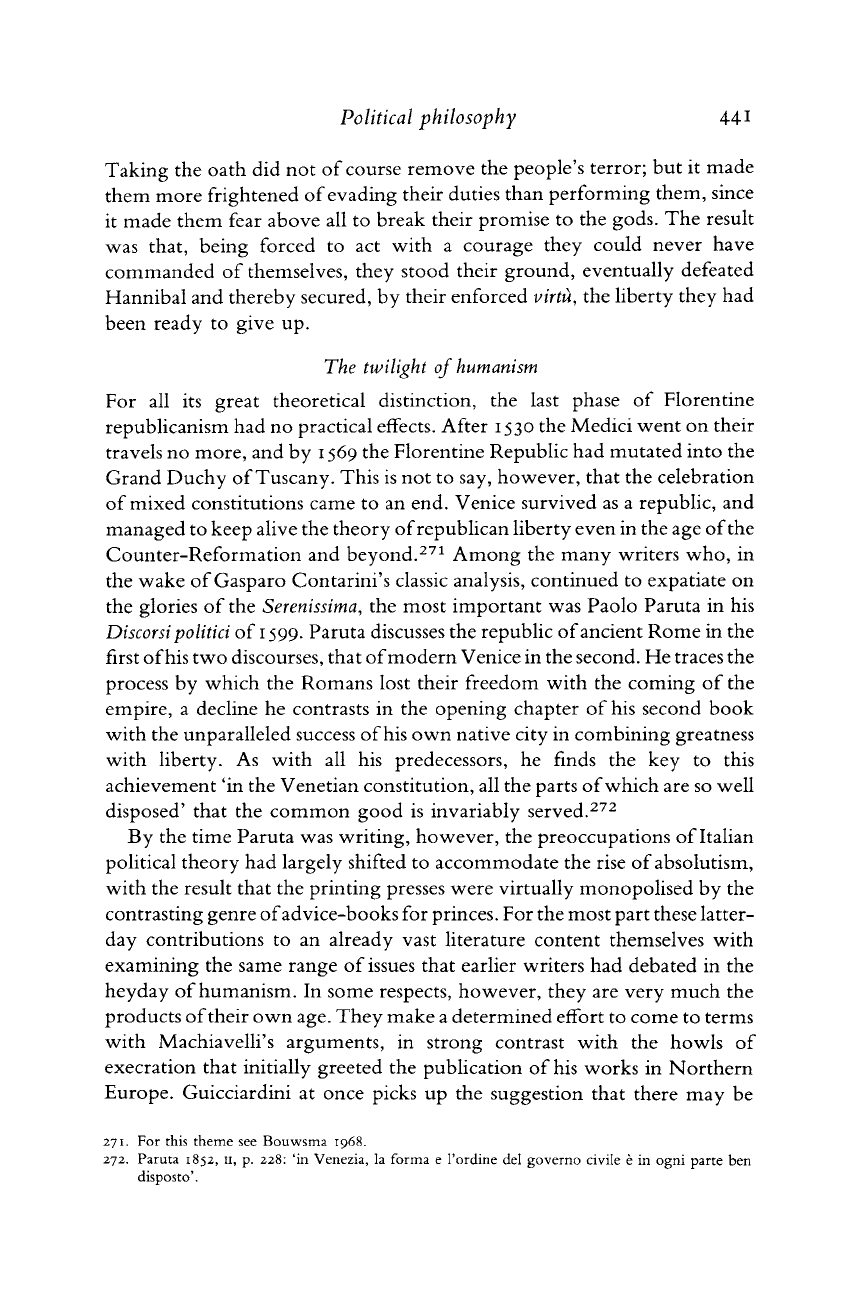
Political
philosophy
441
Taking the oath did not of course remove the
people's
terror;
but it made
them more frightened
of
evading their duties than performing them, since
it made them fear above all to break their promise to the gods. The result
was that,
being
forced to act
with
a courage they could never have
commanded of themselves, they stood their ground, eventually defeated
Hannibal and thereby secured, by their enforced virtu, the liberty they had
been ready to
give
up.
The
twilight of humanism
For
all its great theoretical distinction, the last phase of Florentine
republicanism had no practical effects. After
1530
the Medici went on their
travels
no more, and by
1569
the Florentine Republic had mutated into the
Grand
Duchy
of
Tuscany.
This is not to say, however, that the celebration
of
mixed constitutions came to an end. Venice survived as a republic, and
managed to keep alive the theory
of
republican liberty
even
in the age
of
the
Counter-Reformation
and beyond.
271
Among the many writers who, in
the wake of
Gasparo
Contarini's classic analysis, continued to expatiate on
the glories of the
Serenissima,
the most important was Paolo
Paruta
in his
Discorsi
politici
of
1599.
Paruta
discusses the republic
of
ancient Rome in the
first
of
his two discourses, that
of
modern Venice in the second. He
traces
the
process by which the Romans lost their freedom
with
the coming of the
empire, a decline he contrasts in the
opening
chapter of his second book
with
the unparalleled success
of
his own native city in combining greatness
with
liberty. As
with
all his predecessors, he
finds
the key to this
achievement 'in the Venetian constitution, all the parts
of
which are so
well
disposed' that the common good is invariably served.
272
By
the time
Paruta
was writing, however, the preoccupations of Italian
political theory had largely shifted to accommodate the rise of absolutism,
with
the result that the printing presses were virtually monopolised by the
contrasting genre
of
advice-books for princes.
For
the most
part
these
latter-
day contributions to an already vast literature content themselves
with
examining the same range of
issues
that earlier writers had debated in the
heyday of humanism. In some respects, however, they are very much the
products
of
their
own age. They make a determined effort to come to terms
with
Machiavelli's arguments, in strong contrast
with
the
howls
of
execration
that initially greeted the publication of his works in Northern
Europe.
Guicciardini at once picks up the suggestion that there may be
271.
For
this
theme
see
Bouwsma
1968.
272.
Paruta
1852, 11, p. 228: 'in
Venezia,
la
forma
e
l'ordine
del
governo
civile
e in
ogni
parte
ben
disposto'.
Cambridge Histories Online © Cambridge University Press, 2008
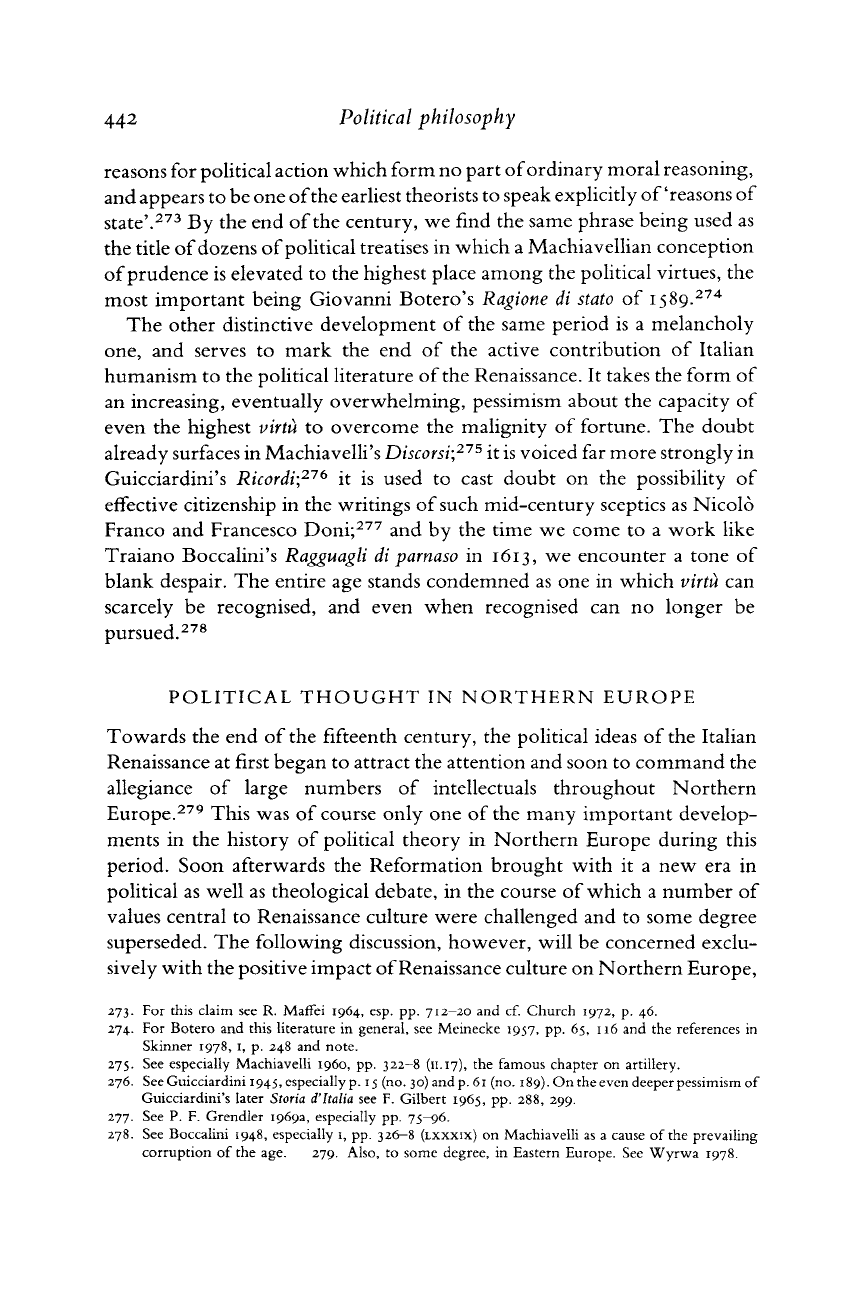
442
Political
philosophy
reasons for political action which form no
part
of
ordinary
moral reasoning,
and
appears
to be one
of
the earliest theorists to speak explicitly of'reasons of
state'.
273
By the end of the century, we
find
the same phrase
being
used as
the title
of
dozens
of
political treatises in which a Machiavellian conception
of
prudence is elevated to the highest place among the political virtues, the
most important
being
Giovanni Botero's
Ragione
di
stato
of
1589.
274
The other distinctive development of the same period is a melancholy
one, and serves to
mark
the end of the active contribution of Italian
humanism to the political literature of the Renaissance. It takes the form of
an increasing, eventually overwhelming, pessimism about the capacity of
even
the highest virtu to overcome the malignity of fortune. The doubt
already
surfaces in Machiavelli's
Discorsr
275
it is voiced far more strongly in
Guicciardini's
Ricordi;
276
it is used to cast doubt on the
possibility
of
effective citizenship in the writings of such mid-century sceptics as
Nicolo
Franco
and
Francesco
Doni;
277
and by the time we come to a work
like
Traiano
Boccalini's
Ragguagli
di
parnaso
in
1613,
we encounter a tone of
blank despair. The entire age stands condemned as one in which virtu can
scarcely
be recognised, and
even
when
recognised can no longer be
pursued.
278
POLITICAL
THOUGHT IN NORTHERN
EUROPE
Towards the end of the fifteenth century, the political ideas of the Italian
Renaissance at first began to
attract
the attention and
soon
to command the
allegiance of large numbers of intellectuals throughout Northern
Europe.
279
This was of course
only
one of the many important develop-
ments in the history of political theory in Northern Europe during this
period. Soon afterwards the Reformation brought
with
it a new era in
political as
well
as theological debate, in the course of which a number of
values central to Renaissance culture were challenged and to some degree
superseded. The
following
discussion, however,
will
be concerned exclu-
sively
with
the positive impact
of
Renaissance culture on Northern
Europe,
273. For
this
claim
see R. Maffei 1964, esp. pp. 712-20 and cf. Church 1972, p. 46.
274. For
Botero
and
this
literature
in
general,
see
Meinecke
1957, pp. 65, 116 and the
references
in
Skinner
1978, 1, p. 248 and
note.
275. See
especially
Machiavelli
i960,
pp.
322-8
(и.
17),
the
famous
chapter
on
artillery.
276. See Guicciardini 1945,
especially
p. 15 (no. 30) and p. 61 (no. 189). On the
even
deeper
pessimism
of
Guicciardini's
later
Storia d'Italia see F. Gilbert 1965, pp. 288, 299.
277. See P. F. Grendler
1969a,
especially
pp.
75—96.
278. See
Boccalini
1948,
especially
1, pp.
326-8
(LXXXIX)
on Machiavelli as a
cause
of the
prevailing
corruption
of the age. 279. Also, to
some
degree,
in
Eastern
Europe. See Wyrwa 1978.
Cambridge Histories Online © Cambridge University Press, 2008
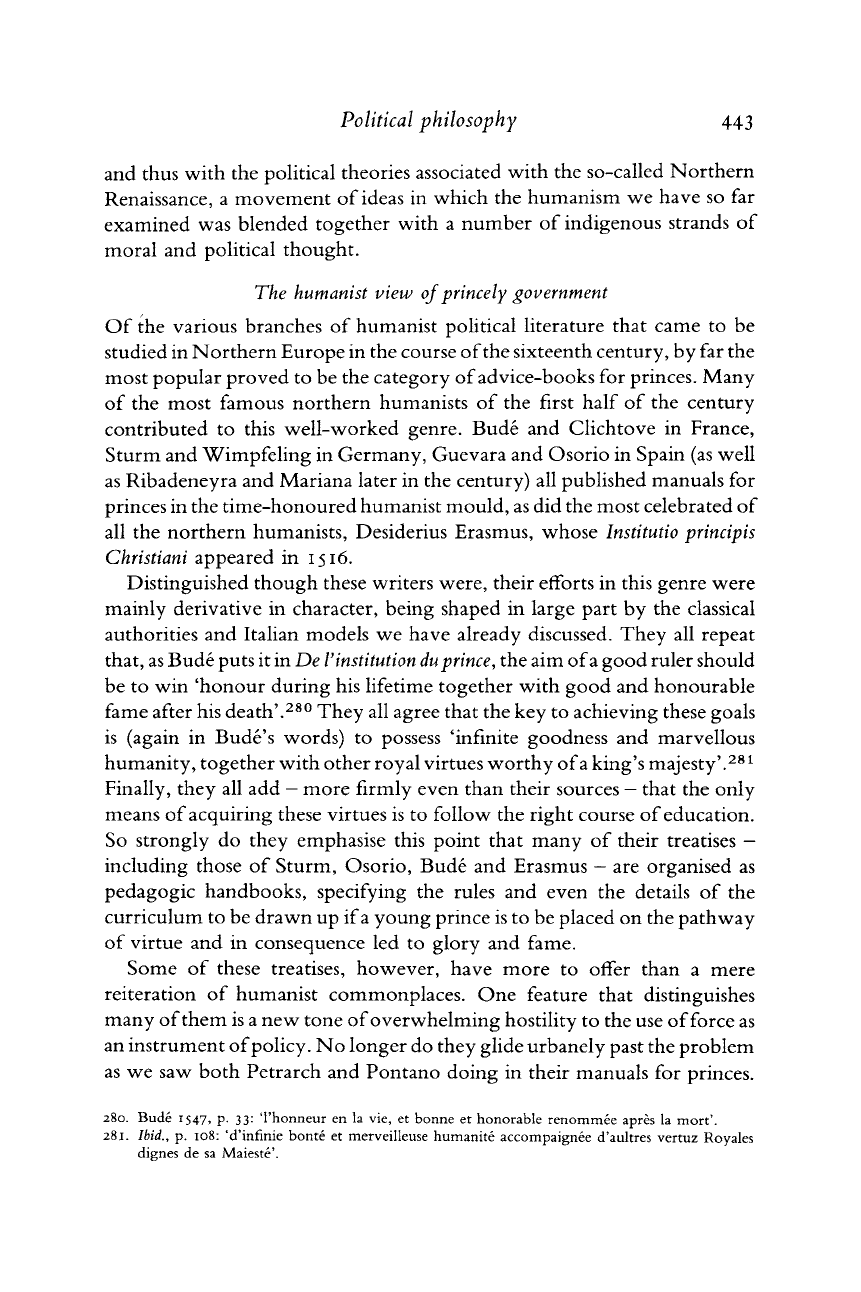
Political
philosophy
443
and thus
with
the political theories associated
with
the so-called Northern
Renaissance, a movement of ideas in which the humanism we have so far
examined was blended together
with
a number of
indigenous
strands of
moral
and political thought.
The
humanist view
of
princely
government
Of
the various branches of humanist political literature that came to be
studied in Northern Europe in the course
of
the sixteenth century, by far the
most popular proved to be the category
of
advice-books for princes. Many
of
the most famous northern humanists of the first half of the century
contributed to this well-worked genre. Budé and Clichtove in
France,
Sturm
and Wimpfeling in Germany, Guevara and Osorio in Spain (as
well
as Ribadeneyra and Mariana later in the century) all
published
manuals for
princes in the time-honoured humanist mould, as did the most celebrated of
all the northern humanists, Desiderius Erasmus,
whose
Institutio
principis
Christiani
appeared in
1516.
Distinguished
though these writers were, their efforts in this genre were
mainly derivative in
character,
being
shaped in large
part
by the classical
authorities and Italian models we have already discussed. They all repeat
that,
as
Budé puts it in De l'institution
du
prince,
the aim
of
a
good ruler should
be to win 'honour during his lifetime together
with
good and honourable
fame after his death'.
280
They all agree that the key to achieving these goals
is (again in Budé's words) to
possess
'infinite
goodness and marvellous
humanity, together
with
other royal virtues worthy
of
a
king's
majesty'.
281
Finally, they all add
—
more firmly
even
than their sources
—
that the only
means of acquiring these virtues is to
follow
the right course of education.
So strongly do they emphasise this point that many of their treatises
—
including those of Sturm, Osorio, Budé and Erasmus
—
are organised as
pedagogic handbooks,
specifying
the rules and
even
the details of the
curriculum
to be drawn up
if
a
young prince is to be placed on the pathway
of
virtue and in consequence led to glory and fame.
Some of these treatises, however, have more to offer than a mere
reiteration
of humanist commonplaces. One feature that
distinguishes
many
of
them is a new tone
of
overwhelming hostility to the use
of
force
as
an instrument
of
policy. No longer do they
glide
urbanely past the problem
as we saw both
Petrarch
and Pontano
doing
in their manuals for princes.
280.
Budé
1547, p- 33^
'l'honneur
en la vie, et
bonne
et
honorable
renommée
après
la
mort'.
281. Ibid., p. 108:
'd'infinie
bonté
et
merveilleuse
humanité
accompaignée
d'aultres
vertuz
Royales
dignes
de sa
Maiesté'.
Cambridge Histories Online © Cambridge University Press, 2008
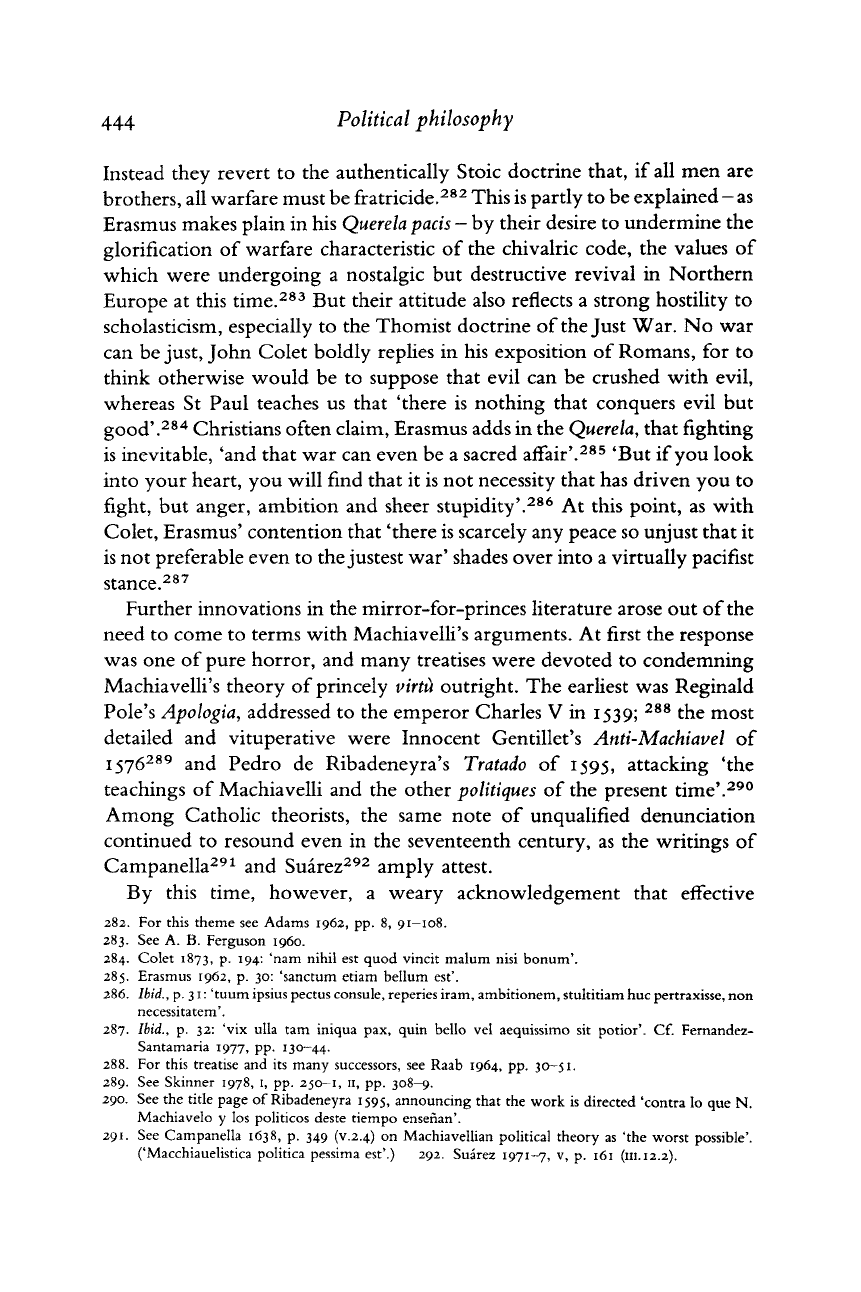
444
Political
philosophy
Instead they revert to the authentically Stoic doctrine that, if all men are
brothers,
all
warfare
must be fratricide.
282
This is partly to be explained - as
Erasmus
makes plain in his
Querela
pads
- by their desire to undermine the
glorification of warfare characteristic of the chivalric code, the values of
which were undergoing a nostalgic but destructive revival in Northern
Europe
at this time.
283
But their attitude also reflects a strong hostility to
scholasticism, especially to the Thomist doctrine of the
Just
War.
No war
can
be just, John Colet boldly replies in his exposition of Romans, for to
think otherwise
would
be to suppose that
evil
can be crushed with
evil,
whereas St Paul teaches us that 'there is nothing that conquers
evil
but
good'.
284
Christians often claim,
Erasmus
adds in the
Querela,
that fighting
is inevitable, 'and that war can even be a sacred affair'.
285
'But if you look
into your heart, you
will
find
that it is not necessity that has driven you to
fight, but anger, ambition and sheer stupidity'.
286
At this point, as with
Colet,
Erasmus'
contention that 'there is scarcely any peace so unjust that it
is not preferable even to the justest war' shades over into a virtually pacifist
stance.
287
Further
innovations in the
mirror-for-princes
literature arose out of the
need to come to terms with Machiavelli's arguments. At first the response
was one of pure
horror,
and many treatises were devoted to condemning
Machiavelli's theory of princely virtu outright. The earliest was Reginald
Pole's
Apologia,
addressed to the emperor Charles V in
1539;
288
the most
detailed and vituperative were Innocent Gentillet's Anti-Machiavel of
1576
289
and Pedro de Ribadeneyra's
Tratado
of 1595, attacking 'the
teachings of Machiavelli and the other
politiques
of the present time'.
290
Among Catholic theorists, the same note of unqualified denunciation
continued to resound even in the seventeenth century, as the writings of
Campanella
291
and Suarez
292
amply attest.
By
this time, however, a weary acknowledgement that effective
282. For
this
theme
see Adams 1962, pp. 8, 91-108.
283. See A. B.
Ferguson
i960.
284. Colet 1873, P- 194- 'nam
nihil
est
quod
vincit
malum
nisi
bonum'.
285.
Erasmus
1962, p. 30:
'sanctum
etiam
bellum
est'.
286. Ibid., p. 31:
'tuum
ipsius
pectus
consule,
reperies
iram,
ambitionem,
stultitiam
hue
pertraxisse,
non
necessitatem'.
287. Ibid., p. 32: 'vix
ulla
tarn
iniqua
pax,
quin
bello
vel
aequissimo
sit
potior'.
Cf. Fernandez-
Santamaria 1977, pp.
130-44.
288. For
this
treatise
and its
many
successors,
see Raab 1964, pp. 30-51.
289. See
Skinner
1978, 1, pp. 250-1, 11, pp.
308-9.
290. See the
title
page of Ribadeneyra 1595,
announcing
that the work is
directed
'contra
lo que N.
Machiavelo y los
politicos
deste
tiempo
ensefian'.
291. See Campanella 1638, p. 349
(v.2.4)
on Machiavellian
political
theory
as 'the
worst
possible'.
('Macchiauelistica
politica
pessima
est'.)
292. Suarez 1971-7, v, p. 161 (m.12.2).
Cambridge Histories Online © Cambridge University Press, 2008
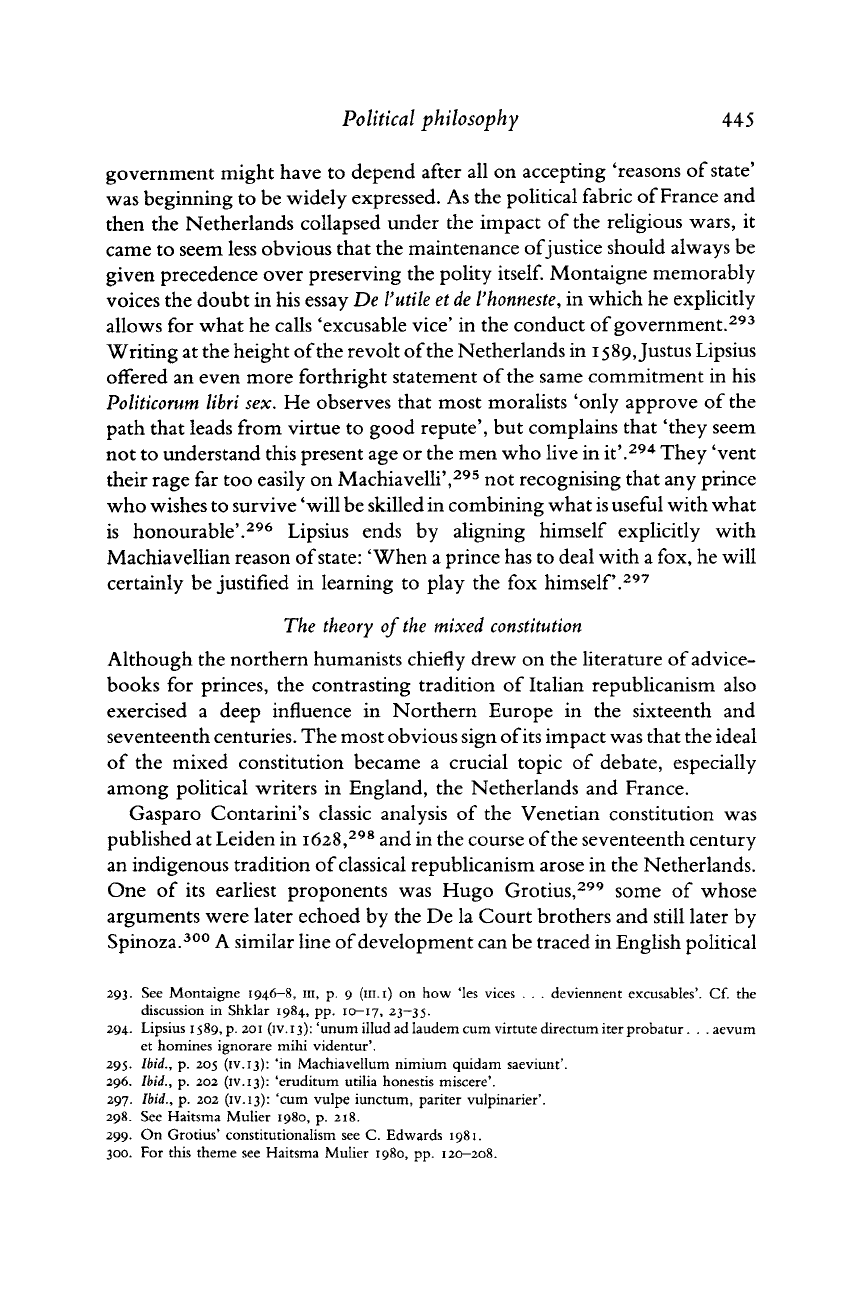
Political
philosophy
445
government might have to depend after all on accepting 'reasons of
state'
was beginning to be
widely
expressed. As the political fabric
of
France
and
then the Netherlands collapsed under the impact of the religious wars, it
came
to seem
less
obvious that the maintenance
of
justice should always be
given precedence over preserving the polity
itself.
Montaigne memorably
voices the doubt in his essay De Vutile et de Vhonneste, in which he explicitly
allows for what he calls 'excusable vice' in the conduct of government.
293
Writing
at the height
of
the revolt
of
the Netherlands in
1589,
Justus
Lipsius
offered an even more forthright statement of the same commitment in his
Politicorum
libri
sex. He observes that most moralists 'only approve of the
path
that leads from virtue to good repute', but complains that 'they seem
not to understand this present age or the men who
live
in it'.
294
They 'vent
their
rage far too easily on Machiavelli',
295
not recognising that any prince
who
wishes
to survive
'will
be
skilled
in combining what is useful with what
is honourable'.
296
Lipsius ends by aligning himself explicitly with
Machiavellian reason
of
state:
'When a prince has to deal with a fox, he
will
certainly
be justified in learning to play the fox himself'.
297
The theory
of the
mixed
constitution
Although the northern humanists chiefly drew on the literature
of
advice-
books for princes, the contrasting tradition of Italian republicanism also
exercised a deep influence in Northern Europe in the sixteenth and
seventeenth centuries. The most obvious
sign
of
its impact was that the ideal
of
the mixed constitution became a crucial topic of debate, especially
among political writers in England, the Netherlands and
France.
Gasparo
Contarini's classic analysis of the Venetian constitution was
published at Leiden in
162
8,
2
9 8
and in the course
of
the seventeenth century
an
indigenous tradition
of
classical republicanism arose in the Netherlands.
One of its earliest proponents was Hugo Grotius,
299
some of whose
arguments
were later echoed by the De la Court brothers and
still
later by
Spinoza.
300
A similar
line
of
development can be
traced
in English political
293. See
Montaigne
1946-8,
m, p. 9
(III.I)
on how 'les
vices
. . .
deviennent
excusables'.
Cf. the
discussion
in Shklar 1984, pp. 10-17,
23-35.
294.
Lipsius
1589, p. 201 (iv.13):
'unum
illud
ad
laudem
cum
virtute
directum
iter
probatur
. . .
aevum
et
homines
ignorare
mihi
videntur'.
295. Ibid., p. 205 (iv.13): 'in Machiavellum
nimium
quidam
saeviunt'.
296. Ibid., p. 202 (iv.13):
'eruditum
utilia
honestis
miscere'.
297. Ibid., p. 202 (iv.13): 'cum
vulpe
iunctum,
pariter
vulpinarier'.
298. See
Haitsma
Mulier 1980, p. 218.
299. On Grotius'
constitutionalism
see C. Edwards 1981.
300. For
this
theme
see
Haitsma
Mulier 1980, pp.
120-208.
Cambridge Histories Online © Cambridge University Press, 2008
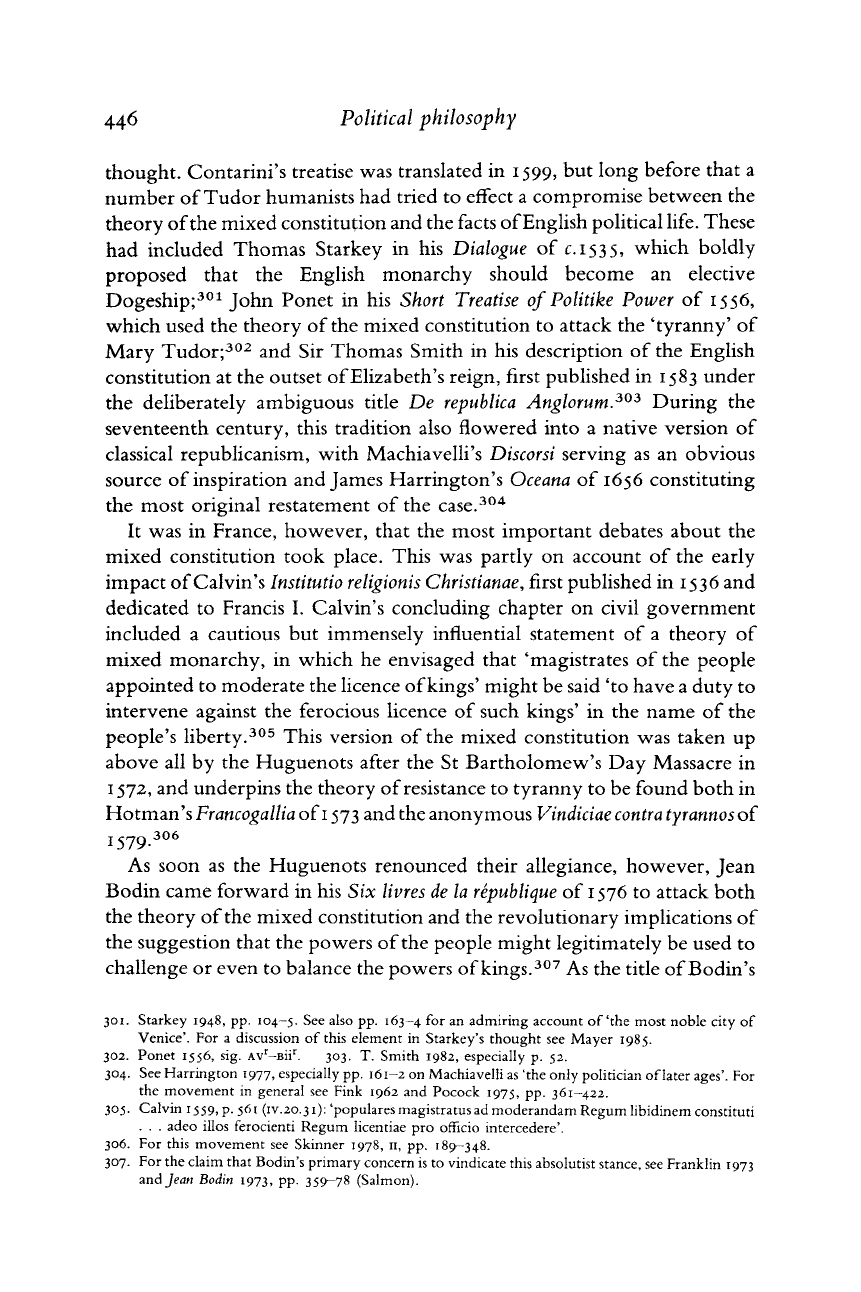
446
Political
philosophy
thought. Contarini's treatise was translated in
1599»
but long before that a
number
of
Tudor
humanists had tried to effect a compromise between the
theory
of
the
mixed constitution and the facts
of
English political
life.
These
had
included Thomas Starkey in his
Dialogue
of
c.
1535,
which boldly
proposed that the English monarchy should become an elective
Dogeship;
301
John Ponet in his
Short
Treatise
of
Politike
Power
of
1556,
which used the theory of the mixed constitution to
attack
the 'tyranny' of
Mary
Tudor;
302
and Sir Thomas Smith in his description of the English
constitution at the outset
of
Elizabeth's
reign, first published in
1583
under
the
deliberately ambiguous title De
república
Anglorum.
303
During the
seventeenth century, this tradition also flowered into a native version of
classical
republicanism, with Machiavelli's
Discorsi
serving as an obvious
source
of inspiration and
James
Harrington's
Oceana
of
1656
constituting
the
most original restatement of the case.
304
It
was in
France,
however, that the most important debates about the
mixed constitution took place. This was partly on account of the early
impact
of
Calvin's Institutio
religionis
Christianae,
first published in
1536
and
dedicated to
Francis
I. Calvin's concluding chapter on civil government
included a cautious but immensely influential statement of a theory of
mixed monarchy, in which he envisaged that 'magistrates of the people
appointed to moderate the licence
of
kings' might be said 'to have a duty to
intervene against the ferocious licence of such kings' in the name of the
people's liberty.
305
This version of the mixed constitution was taken up
above all by the Huguenots after the St Bartholomew's Day Massacre in
1572,
and underpins the theory
of
resistance
to tyranny to be found both in
Hotman's
Francogallia
of
1573
and the anonymous
Vindiciae
contra
tyrannos of
1579.
306
As soon as the Huguenots renounced their allegiance, however,
Jean
Bodin came forward in his Six
livres
de la
république
of
1576
to
attack
both
the
theory
of
the
mixed constitution and the revolutionary implications of
the
suggestion that the powers of
the
people might legitimately be used to
challenge or even to balance the powers
of
kings.
307
As the title
of
Bodin's
301. Starkey 1948, pp. 104-5. See
also
pp. 163-4 for an admiring
account
of'the
most
noble
city of
Venice'. For a
discussion
of
this
element
in Starkey's thought see Mayer 1985.
302.
Ponet
1556, sig.
AV
r
-Bii
r
.
303. Т. Smith 1982,
especially
p. 52.
304. See Harrington 1977,
especially
pp. 161-2 on Machiavelli as 'the
only
politician
of
later
ages'. For
the
movement
in
general
see Fink 1962 and Pocock 1975, pp. 361-422.
305. Calvin 1559, p. 561
(iv.20.31):
'populares
magistratus
ad
moderandam
Regum
libidinem
constituti
.
. .
adeo
illos
ferocienti
Regum
licentiae
pro
officio
intercederé'.
306. For
this
movement
see Skinner 1978, и, pp.
189-348.
307. For the
claim
that
Bodin's
primary
concern
is to vindicate
this
absolutist
stance,
see Franklin 1973
and Jean Bodin 1973, pp-
359~78
(Salmon).
Cambridge Histories Online © Cambridge University Press, 2008
